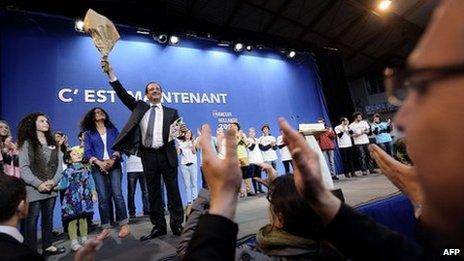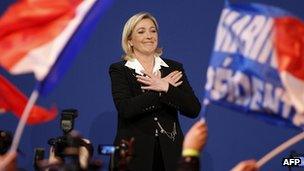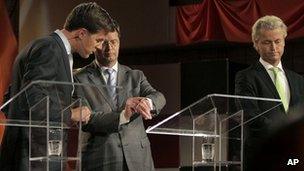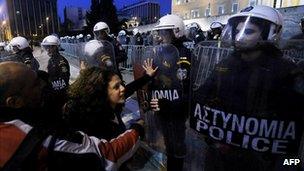Europe: A crisis of the centre
- Published
- comments

Francois Hollande has declared that the world of finance is his enemy
Last December Europe decided to outlaw expansionary fiscal policy. Twenty-five countries pledged to get their debts below 60% of GDP, and their "structural deficits" down to 0.5% - and keep them there - by 2014.
David Cameron vetoed an attempt to write this into the fundamental treaty of the European Union, so the participants - everybody except Britain and the Czech Republic - signed up to a "Fiscal Stability Treaty".
Now, long before ratification, it has brought down the government of The Netherlands and looks set itself to be blown out of the water by a Francois Hollande victory in France.
Even though Mr Hollande has rowed back from his pledge to "renegotiate" the Treaty, in favour of "adding growth clauses", the Germans in the shape of CDU chief whip Peter Altmaier on Newsnight last night, point out this cannot be done without killing the Treaty. For the Irish are set to vote in a referendum on the Treaty as unamended, within six weeks.
I said when the Treaty was designed that it might bring stability, but not growth. Now Europe is probably in the third quarter of a double dip recession. As economist Nouriel Roubini pointed out (13 April):

Marine Le Pen achieved 18% of the French vote, the highest ever for her party
"Front-loaded fiscal austerity - however necessary - is accelerating the contraction, as higher taxes and lower government spending and transfer payments reduce disposable income and aggregate demand. Moreover, as the recession deepens, resulting in even wider fiscal deficits, another round of austerity will be needed. And now, thanks to the fiscal compact, even the eurozone's core will be forced into front-loaded recessionary austerity."
And so it has come to pass that French growth has ground to a halt, French official unemployment has passed 10%, and the French people have voted in large numbers against the Merkel-Sarkozy strategy of upfront austerity. Indeed six million of them voted against the euro.
Of course countries with a fiscal Luger held to their head have rushed to ratify the Treaty: Greece, Portugal, the Slovenian parliament voted it through with just two abstentions. For them, signing the Treaty was easy because they had no choice.
Treaty revision
What is emerging now though is a concerted attempt to re-look at the Treaty's terms. Two weeks ago, in a little noticed move, the Socialist Party in Portugal, who voted for ratification, proposed the addition of "growth clauses" similar to those advocated by Mr Hollande. These were rejected, but will no doubt come back on a European level if Ireland votes the Treaty down.
But what could a "growth clause" mean? Europe's problem is that it has to rely on upfront austerity because the euro's design has limited the power of the central bank to use monetary policy to promote growth.
Though its impact is now flagging across the globe, monetary expansion has proven the effective lifeline in the first four years of the Great Recession. Printing money allows you to save the banks, keep stock markets buoyant and - surreptitiously - export the crisis to your trade rivals by tanking your own exchange rate.
It does not actually boost demand much directly, but if combined with fiscal expansion - as in the US - it can produce a weak recovery even in a country with a massive debt overhang.
Poor Europe, however, cannot even get to first base. It cannot do proper monetary expansion; its banks are "saved" but lending is contracting; its new fiscal rules tell it to keep budget deficits to a minimum, even as GDP contracts. And crucially it cannot get the unofficial benefits of monetary expansion, which is a lower exchange rate.
Demographic pressures
So now a rash of elections is forcing the technocrats to face up to what they have created.
It would be stupid to pretend the 18% vote for Marine Le Pen's Front National is only about economics. There is a long-term rejection among a section of French voters of what they see as the erosion of their national, secular culture (apparently 30% of working class votes went to Le Pen).
The same demographic pressures, from immigration and stagnant labour markets, allowed Geert Wilders' Freedom Party to gain 15.5% of the vote in the Netherlands in 2010, the Danish People's Party a consistent 12-13%, the Flemish Interest party about 15% in the Flemish regional parliament etc.

Geert Wilders' Freedom Party has made in-roads into mainstream Dutch politics
But unemployment, austerity, depressed communities and the failing narrative of the liberal centre in European politics is not some endless stasis to which the continent is condemned. It is producing political instability.
If the economics get worse then there is only one inflection point that matters: the point at which a parliamentary majority, or largest party status, is achieved for a grouping that opposes the euro, or is outright protectionist, or rejects austerity at the price of provoking a clash with the financial markets, followed swiftly by a "debtor led default", nationalisations etc.
And here is the danger inherent in the European situation. I say "danger" with some hesitation, because as a public service journalist you have to be above the fray, and if this event occurs, changing the dynamics of the entire continent, we will have to find dispassionate language to understand it, report it, and accept it as the new reality.
Nonetheless, Europe right now is the only one of the big economic blocs in the world where politics is in danger of taking over from economics as the driver of crisis.
Lessons from the past
The crunch could come as soon as 6 May in Greece: in the last opinion poll, the combined ratings of the two main parties, socialist and conservative, was 36%; the combined poll ratings of the Communists, Eurocommunists, Trotskyists and Greens was 37%. A new, more effective nationalist right-wing grouping has been formed, and is polling 11% (the old right party LAOS is languishing at 3% after it eviscerated itself by supporting the austerity plan).
And Greeks will soon get to see a 45-minute primetime interview with the candidate of Golden Dawn, whose flag looks like this, external:
We have only seen a rapid move to the right and left in European politics once before, and it bears studying in detail - not with the habitual lazy stereotype lens provided by TV dramas.
There were two "moments" in the defeat of liberal centrist politics in Germany, Austria, Spain etc. in the 1930s: the first, where polite society realised the working classes were swinging to the right and left, but patronisingly reassured themselves that the world of Jazz, surrealist poetry and foreign holidays could never end. That is, they said to themselves: the workers are clinging to the past, but we, avatars of a more liberal and progressive future, have economic history with us, which points only in the direction of liberalism and economic co-operation.
The second moment of fatalism came at the shock of fascist or far right election victories: "the people have stupidly ignored our advice, there is nothing to be done, let's emigrate or retreat to our country homes" etc.

In Greece economic crisis has led to social collapse
I simplify, even here, of course. But the parallels are clear: right now much of the political centre, the media establishment etc. in Europe has adopted that late Jazz Age fatalistic disdain: they voted for him/her? How troubling, how irrelevant.
But here's the problem. Le Pen's Front National and Wilders Freedom Party are by no means "fascist" in the way the NSDAP or Action Francaise were in the early 1930s. And of the Greek left parties, none are as viscerally revolutionary as they were in their grandfathers' generation. But they do not need to be in order to deliver an electoral shock on the scale that took place in several European countries in the early 1930s. They represent a fundamental break with a globalised, liberalised Europe.
In previous decades, mainstream conservatives could neutralise the anti-immigration right by adopting their policies; social democrats could neutralise the left by delivering welfare benefits to the poor and jobs to the workers. What neither can do is break fundamentally from a pro-globalisation stance, so the old neutralisation tactics of the centre are ceasing to work. Of course, at the same time they are losing control of an important lever of power: the mainstream media, which can be circumvented by heterodox parties and movements quite easily now.
Reduced social bonds
What is startling to an economic and social historian is how large these left and right wing votes have become, despite the fact that the crisis has been ameliorated by stimulus, and despite the high material starting point of modern economies.
So far only Greece has been pushed to the edge of social breakdown. And it is not wrong to point out that the material level most people in Europe enjoy is way above that which pushed their predecessors in the 1930s towards the extremes. My grandfather's generation spent their last penny and then starved; they had their furniture seized by the means-test man; you could see the effects in stunted growth and chronic illness even in the 1960s and 70s.
By contrast this generation has managed to rediscover nationalist, socialist (not to mention horizontalist anarchist) politics concurrently with buying iPods and Blackberries like there is no tomorrow. To put it bluntly, though the crisis is less extreme, our capacity for suffering is also reduced, as are our social bonds.
Roubini has pointed out, and I agree, that what the ECB's spending splurge created was a "holiday" from crisis. Another bond market participant puts it, in distasteful but accurate terms: Europe now has, instead of a heart attack, economic cancer. But many market strategists now think the holiday is coming to an end. The only question is sooner or later.
The challenge for the centre - before "centre left" and "centre right" just merge, historically, into a term that describes an old, defeated order - is very clear. They have to come up with a strategy for growth across Europe that is acceptable to the hard-working people who vote for them.
If they want to stick to austerity and the destruction of the social Europe they have to explain how it leads eventually to growth; if they want to break with austerity, they have to explain where the money to finance the continued social model is going to come from.